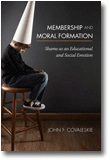
Membership and Moral Formation
Shame as an Educational and Social Emotion
By:
John F. Covaleskie, University of Oklahoma
Published 2013
This book is an attempt to relate moral formation to democratic life and to the emotional emotion of shame. The argument is that shame is essential to moral formation, that it tells us when we are violating our own moral norms. Contrary to common belief, I argue that shame is neither imposed on us by others (though it is certainly a product of our communal memberships) nor necessarily harmful. In fact I argue that shame not only can be beneficial for us, but that moral formation and growth are both inextricably linked to a proper sense of shame, a properly formed conscience.
The process of moral formation is an important one for any society, but perhaps most of all for a democratic society. The foundational premise of democratic life is that we have the capacity to be self-governing, the desire to do the right thing, and the wisdom to discern what the right thing is. This is unlikely to happen unless there is a conscious effort to form the conscience of the young so that they can become democratic citizens.
Which brings up, then, the question of moral education. Whatever it is that a particular society or community considers to be “moral,” the question of moral education is how do members of the community come to be moral? Given that moral formation of the young is necessary, this discussion ends with a look at the practice of two exemplary democratic moral practitioners, Vivian Paley and Deborah Meier, whose pedagogy shows how formation of young consciences can be done by thoughtful adults with integrity.
CONTENTS
Acknowledgments. Introduction. 1 Why Shame? 2 Democracy and Virtue. 3 The Role of Membership in Moral Formation. 4 Vocabulary of Moral Judgment and Moral Membership. 5 Other Views of Shame. 6 Who Am I? The Question of Moral Identity. 7 Shame, Guilt, and Identity. 8 Schooling, Community, and the Educational Function of Shame. References. Biography.
-
Paperback978-1-62396-192-3
Web price: $45.04 (Reg. 52.99)
-
Hardcover978-1-62396-193-0
Web price: $80.74 (Reg. 94.99)
- eBook978-1-62396-194-7

- SOC000000 - SOCIAL SCIENCE: General
- EDU003000 - EDUCATION: Aims & Objectives
- POL007000 - POLITICAL SCIENCE: Political Ideologies: Democracy
-
 A Trace for the Next Generation
Young Black Theorists Confronting Transnational Racism
A Trace for the Next Generation
Young Black Theorists Confronting Transnational Racism
-
 Conceptualizing Truth
Implications for Teaching and Learning
Conceptualizing Truth
Implications for Teaching and Learning
-
 Democracy at a Crossroads
Reconceptualizing Socio-Political Issues in Schools and Society
Democracy at a Crossroads
Reconceptualizing Socio-Political Issues in Schools and Society
-
 Democracy's Discontent and Civic Learning
Multiple Perspectives
Democracy's Discontent and Civic Learning
Multiple Perspectives
-
 Education for Democracy
A Renewed Approach to Civic Inquiries for Social Justice
Education for Democracy
A Renewed Approach to Civic Inquiries for Social Justice
-
 Partnerships for Leadership Preparation and Development
Facilitators, Barriers and Models for Change
Partnerships for Leadership Preparation and Development
Facilitators, Barriers and Models for Change
-
 Social Studies Teacher Education
Critical Issues and Current Perspectives
Social Studies Teacher Education
Critical Issues and Current Perspectives

